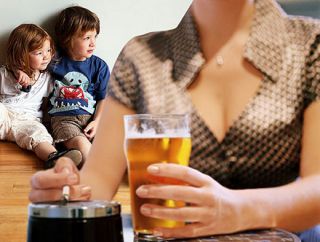Alcoholism
Are Mothers the Gods of Their Children's Drinking?
When it comes to drinking, studies don't tell the whole story.
Posted October 17, 2012

Are Moms to Blame for Their Children's Future Drinking?
"Mother’s Ruin: Mums Determine Their Children’s Drinking Habits,” proclaims the British newspaper, The Telegraph. As the adult daughter of an alcoholic mother, I go into a tailspin when I read the headline. And then there’s the subtitle: “Children follow their mothers' drinking habits in adulthood—but the amount their father drinks makes no difference, a landmark study has found.”
That’s when my age-old fears really start to kick in: Will I, too, someday become an alcoholic? Will my children inherit the gene for alcoholism? If I drink, will it mess my children up? Is everything always the mother’s fault?!
After years of therapy, I am able to understand that these fears are largely irrational. I am a moderate, take-it-or-leave-it drinker, who seems to have inherited, and adopted, my father’s nonaddictive personality and genes. I can also comfort myself with the fact that my mother has been sober for 40 years, which shows me that it’s possible to triumph over the disease of alcoholism.
When I take a deep breath and look at the research rationally, this is what I understand: For this landmark study, Demos, a British think tank, asked 18,000 people born in 1970 about their drinking habits at age 16, and then again at 34. At 16, participants were also asked if they thought their parents drank never, sometimes, often or always.
The researchers at Demos concluded that the drinking habits of 16-year-olds were largely influenced by their peers. But the 34-year-olds were a different story. The more they, as teens, thought their mother drank on the never, sometimes, often or always scale, the more they followed in her footsteps and drank (or binge drank) as adults.
The problem with this study is that it lacks nuance. A 16-year-old whose mother drinks one glass of wine a night might answer that her mother drinks “always.” A teen whose mother drinks a fifth of vodka a night would also answer “always.” Can these mothers’ drinking habits be lumped together?
Similarly, as the researchers acknowledged, there are explanations for why fathers were left out of this equation. For one thing, in the 1970s in England, when this study was conducted, men tended to drink outside the home, in pubs. Women, on the other hand, were tied to their families. If moms drank, they drank at home. When asked if their mothers drank, the 16-year-olds could report only on what they saw or thought they saw (and remember—this is based on the black-and-white perceptions of teenagers).
Jonathan Birdwell, head of the citizen’s program at Demos, said, “‘[The] cultural acceptability’ of male drinking might also reduce the influence of fathers on their children’s attitudes to alcohol.” In other words, women’s drinking is simply more loaded than men’s, so the same amount of drinking could be perceived differently for Mom and Dad.
Let’s take a case study of a real person: me. If a researcher had asked me at 16, “How often do you drink?” I would have answered, “Never.” To the question, “How often does your mom drink?” I would have answered, “Never.” At that point, she was a recovered alcoholic, so she abstained from drinking. Would my answer tell the whole story? No.
At 16, I was an adamant non-drinker, in large part as a reaction to my wild-child older sister and my alcoholic mother. My peers had no influence on me, as this study suggests they do at age 16. They drank—I didn’t. I was immune to peer pressure, at that point, precisely because of the negative associations I had as a result of my mother’s drinking.
If the guys at Demos asked me at 34 how much I drank, I would say “Sometimes.” The researchers would attribute my moderate drinking to my answer, at age 16, that my mother never drank. But they would be missing out on all those years that came before and after.
During college and into my twenties, I often binge drank (a result of my mother’s alcoholic influence?) But what about now, when I drink in moderation, and responsibly? Can they really discount the influence of my moderate-drinking father?
While studies and statistics are fantastic for calling attention to human issues and demystifying huge, complicated topics, it’s equally important that we share our stories, which contain the actual, nuanced details of our lives.
Next time you’re tempted to wring your hands over the latest findings—"Drinking Is Good For You! Drinking Is Bad For You! Mothers Are to Blame and Fathers Don’t Matter!”—remind yourself to look to your own story, which can’t be reduced to another person’s perceptions, or to Never, Sometimes, Often and Always.




